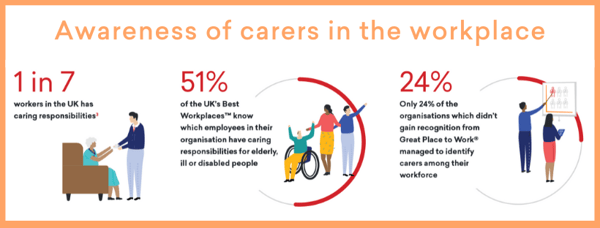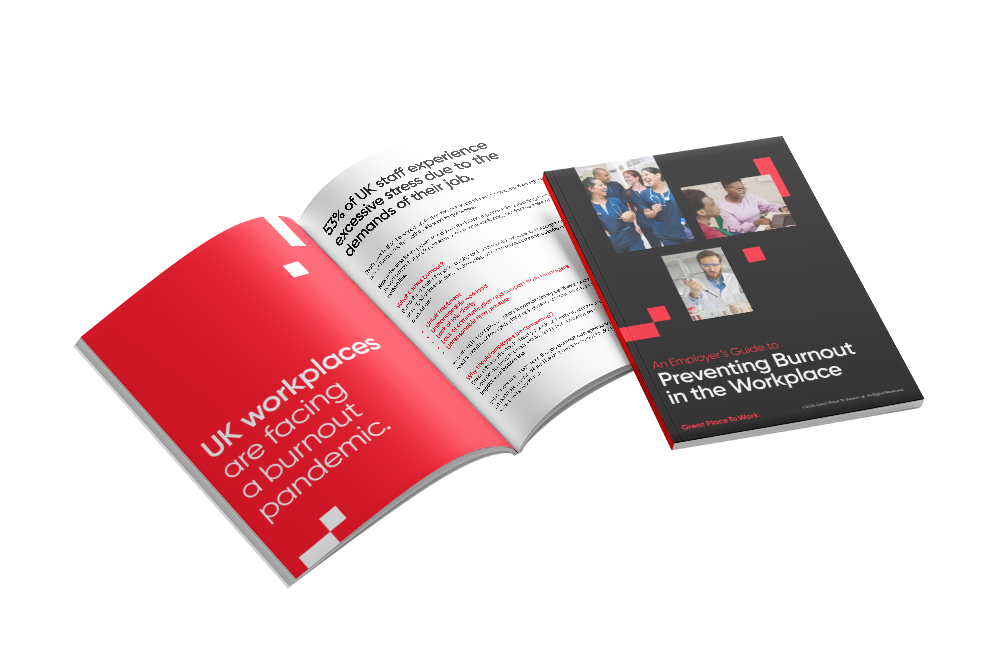One in seven UK employees[1] is caring for an older, sick or disabled family member or friend who cannot manage without their support. Currently, 600 carers leave work every day, a figure which is not sustainable given the challenges to UK productivity. No matter where you are on your journey to creating a culture that supports carers in the workplace, the process of moving from good to great begins by looking at your current practices and taking these 6 big picture action steps towards improvement.
The National Outlook
Around half of the UK’s 6.5 million carers combine work with their unpaid caring responsibilities[1] – often during their prime working years (aged 40-60). Increasing numbers of workers will be taking on caring responsibilities. With our ageing population and rising State Pension age, more people will be combining work with care. As many as 1 in 4 women aged 50-64 have caring responsibilities[2] (1 in 6 men). A growing number of people are also sandwich carers – combining care for an older person with childcare – which can be particularly challenging when combined with paid work. Recent research from the Office for National Statistics showed that more than 1 in 4 sandwich carers are reporting symptoms of mental ill health.
Organisations which do not create a workplace culture that supports carers are potentially at risk of losing top talent and skills; incurring recruitment and retraining costs; and facing productivity losses. All of this will have effects on the bottom line. So how do you begin your journey to a more supportive culture for carers?
Step 1: Get To Know Your Carers

Carers will include many of your most talented and experienced employees who have gained valuable skills and knowledge in the workplace. Gaining insight into these employees’ needs and encouraging them to share and listen to one another’s experiences is a great starting point for creating a culture of support.
To define and create a better understanding of caring responsibilities, managers should begin by normalising the experience. Start a genuine dialogue that raises awareness as a first step towards encouraging carers to seek the support they need.
Step 2: Offer Flexible Working
The government’s Industrial Strategy (2018) has recognised that our ageing population will result in people working longer whilst having to juggle caring responsibilities. This directly impacts on carers’ productivity. Consider how jobs are designed and promoted as flexible, and how flexibility is genuinely embedded in your workplace policies. One example of best practice can be found at Centrica, where employees are offered flexible working, a Carers’ employee network, an employee assistance line, and Carers regional representatives to encourage employees to seek any support they might need.
Step 3: Provide Dedicated Care Leave
Could there be an opportunity for your employees to receive short-term paid care leave (between 5-10 days per year), or perhaps longer periods of unpaid leave in the case of a care emergency? Dedicated care leave can take many forms, so it’s important to assess how this policy fits best for your specific workforce. Carers at Aviva, for example, are given the option to request up to three months of unpaid leave and adjustments to their working patterns, such as part-time hours. At Intuit UK, all employees with at least one year’s service are offered up to four weeks fully-paid time off per year to assist family members who need additional support. Time can be taken in days or weeks and covers scenarios such as supporting a spouse after an operation or finding long-term nursing care for an elderly parent/in-law.

Step 4: Include Carers in Broader Diversity & Inclusion Policies
Employers for Carers recently found that 71% of working carers have felt lonely or isolated in the workplace because of being a carer[3]. Mid-year reviews and L&D opportunities are two ways managers can take tangible steps to avoid employees feeling this way. By recognising the diversity of caring, it becomes easier to offer support which acknowledges and meets the needs of each carer in the workplace.
Step 5: Communicate Your Care Policies
An open and honest culture helps ensure people feel supported to balance work and care. Consider in what ways you could provide and promote links to sources of information and advice for your employees on internal and external platforms. Would employees benefit from a peer support network for sharing learning and support? Creating opportunities for carers to connect and engage with each other helps address the needs of caregivers, and consequently contributes towards higher levels of employee wellbeing.
.png?width=2304&name=6%20Steps%20To%20Creating%20A%20Carer-Friendly%20Culture%20(2).png)
Download your free copy of our Carers Report
Step 6: Monitor and measure
Collecting data around the take-up of policies such as flexible working, as well as metrics for issues such as absenteeism, will provide valuable insight into how your people practices are being implemented and received. With a data-driven approach, specific goals can be set and measured. Our customised programme of workshops and focus groups, for example, are designed to help managers improve current carers policies and other practices which impact the employee experience in their workplace. Based on the organisation’s specific objectives, an Employee Metrics Report can be provided containing comprehensive insight on how your organisation is performing in key areas of the talent management life cycle, benchmarking against UK Best Workplaces™ and/or sector comparisons.
Carers UK’s EfC Digital online platform offers a range of dedicated resources and practical advice for member organisations including line manager guides, e-Learning, templates, sample policies and case studies designed to help build your strategy around supporting working carers.
Download our full report Supporting Working Carers: A Growing Challenge (created in partnership with Carers UK) for more advice on how employers can develop a carer friendly workplace culture.
____________________
[1] Carers UK (2019) Juggling work and unpaid care: A growing issue
[2] Census 2011
[4] Carers UK (2015) Caring and isolation in the workplace









